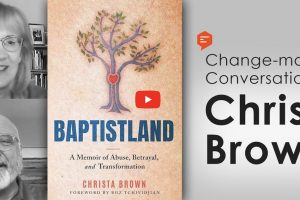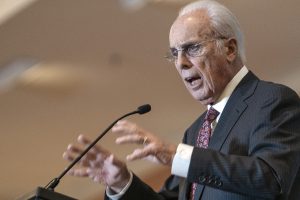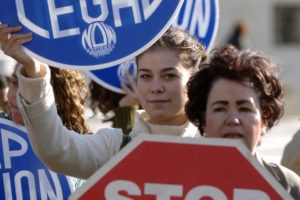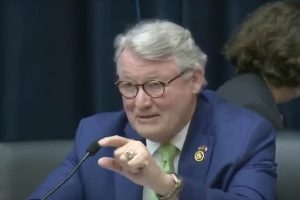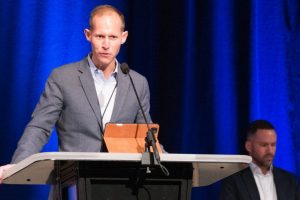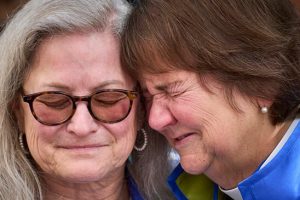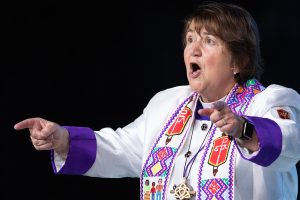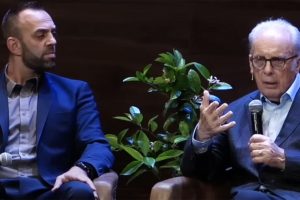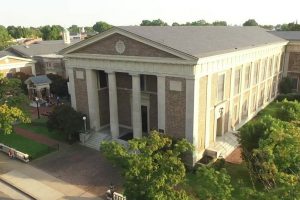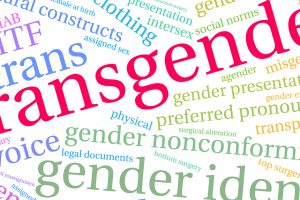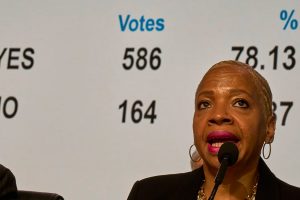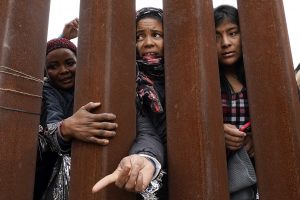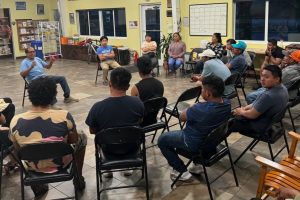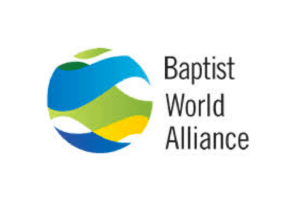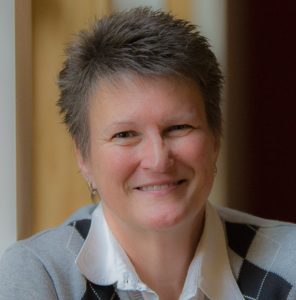 As people of faith around the world joined the Muslims of New Zealand in mourning the deaths of 50 worshippers in the hate-motivated attack on people at prayer, Christian leaders in the United States joined others in offering statements of support for the Muslim community in New Zealand and worldwide.
As people of faith around the world joined the Muslims of New Zealand in mourning the deaths of 50 worshippers in the hate-motivated attack on people at prayer, Christian leaders in the United States joined others in offering statements of support for the Muslim community in New Zealand and worldwide.
Baptist leaders in the U.S. condemned the massacre as evil and reiterated Baptist commitment to freedom of worship. To my knowledge, however, none have called for public examinations of the ways good and well-meaning white Christians, often unaware, contribute to and benefit from the racism and xenophobia that drove not only the gunman in New Zealand but also Dylan Roof who killed nine black worshippers at Emmanuel African Methodist Episcopal Church in Charleston, South Carolina, in 2015.
Simply condemning racism and xenophobia as evil is not enough. The white church has yet to grapple fully with the ways it is implicated in racist violence in the U.S. and around the world.
“The white church has yet to grapple fully with the ways it is implicated in racist violence in the U.S. and around the world.”
In popular understanding, racism has been reduced to attitudes of prejudice rather than institutional structures (including the church) that systematically advantage white people. Even well-meaning white people participate in the structures of racism and benefit from them.
The problem is not one of individual bad actors but of systems. When we position mass shooters as simply “bad apples,” mentally ill or evil individuals who engage in horrific acts, we deny the system of racism in which we are all embedded. That most mass shooters are white males is not incidental or accidental. It is the product of a system in which aggrieved white masculinity asserts itself in violence.
These perpetrators of horrific killings, however, are not the problem; they are the symptom. They reflect, at the extreme, the white supremacy that is often invisible but always present in the structures of American society. White supremacy gives shape to the everyday lives of white people and offers them unearned advantage, even as it masks its benefits behind well-intended commitments to “color-blindness” and meritocracy.
One consequence of the system of racism for white people is an “invisible package of unearned assets” that accrues to them based on race. Peggy McIntosh calls this “white privilege.” These are among examples she offers:
- I can swear, or dress in second-hand clothes, or not answer letters, without having people attribute these choices to the bad morals, the poverty, or the illiteracy of my race.
- I am never asked to speak for all the people of my racial group.
- If a traffic cop pulls me over or if the IRS audits my tax return, I can be sure I haven’t been singled out because of my race.
- I can do well in a challenging situation without being called a credit to my race.
Social class certainly shapes experiences of race. Poor and working class whites may not feel privilege because of their economic conditions, but for poor whites, race does not work against them. The situation of poverty is not exacerbated by their whiteness, and, indeed, their whiteness may serve as one mechanism that helps them navigate systems to address their economic situation.
Most white people recognize overt racism as a problem, but they think the problem can be addressed by expecting whites to behave better toward people of color. However, as Robin DiAngelo explains, simply being nice white people isn’t enough to address the deeply embedded and pervasive structures of racism.
DiAngelo notes how “white fragility” makes authentic conversations about race difficult for most white people. Racial stress arises when white people are confronted by their racial privilege or find themselves in situations that are not racially familiar. This discomfort leads to a number of defensive maneuvers such as outward displays of emotion, argumentation, silence and withdrawal in order to restore racial equilibrium.
For white Christians in particular, white privilege and white fragility also intersect with Christian privilege. Examples of Christian privilege include:
- My holidays will likely be reflected on work and academic calendars.
- I can find foods in line with my religious beliefs in most malls, schools, and entertainment venues.
- I can run for political office without anyone questioning my national loyalty because of my religion.
- I can function easily in U.S. society without having to know or understand any religious beliefs other than my own.
This combination of white and Christian privilege means white Christians do not have to see hidden structures of racism and xenophobia, even as they benefit from them.
“Most white people recognize overt racism as a problem, but they think the problem can be addressed by expecting whites to behave better toward people of color.”
For example, white Christians can embrace, under the guise of loving inclusiveness, slogans like “All lives matter” without engaging the serious and urgent reasons for “Black Lives Matter.” Christians can be completely ignorant about Islam, even as they support a Muslim ban from entry to the U.S. White Christians can call for enforcement of legal immigration without questioning why refugees from Central America make their way to our border. Even the language of the church itself reflects white dominance. How often have we heard “our hearts are black with sin, but we can be made white as snow” without examining the racial undertones of that language? White Christians can worship in their predominantly white churches without fearing someone will shoot them simply for being white and at worship.
While various Christian entities have through the years issued apologies for the church’s role in the mistreatment of indigenous and enslaved African people, apologies do little to address actual structural inequities that are the legacies of Manifest Destiny, slavery and segregation. In fact, Christian privilege can feed a sense of white Christian superiority and exclusiveness.
White Christians can offer thoughts and prayers for victims of a massacre in a mosque or a synagogue and yet never examine the ways the church’s rhetoric feeds Islamophobia and antisemitism. For years, many Christians have treated Muslims and Jews primarily as targets for evangelism without thinking about how the lessening of other faiths contributes to bias against Jews and Muslims.
In 1996, the Southern Baptist Convention passed a resolution affirming the need for evangelizing Jews. In 1999 the SBC created controversy when it published a prayer guide on Rosh Hashanah aimed at converting Jews. In 2014 a former president of the SBC preached a sermon that the Anti-Defamation League feared could “fuel anti-Semitism and could be misunderstood to suggest that Jews are evil and dangerous.”
Another former SBC president famously called the Prophet Mohammad a “pedophile.” A Southern Baptist seminary president claimed “Christians and Muslims do not worship the same God.” In 2017, when the SBC’s International Mission Board joined in an amicus brief opposing a zoning decision that targeted a proposed mosque, one trustee resigned, saying, “If we defend the rights of people to construct places of false worship, are we not helping them speed down the highway to hell?”
Not surprisingly, anti-Muslim rhetoric shows up in extremist manifestos. Norwegian extremist Anders Breivik, who killed 67 people, raged against Muslims and multiculturalism. In his manifesto, he used the Bible to legitimate violence in defense of a white Christian Europe. Newtown shooter Adam Lanza collected news clippings about Breivik. Coast Guard Lieutenant Christopher Hasson, who was charged with planning an attack in the U.S., drew from Breivik. Brenton Tarrant, the suspected gunman in the shootings at two mosques in Christchurch, claims to have been inspired by Breivik.
When the language of the church reinforces the otherness and inferiority of other faiths, it contributes to a white supremacist culture of violence. It normalizes antisemitism and Islamophobia.
White Christians need to commit to anti-racist work to come to terms with the church’s racist past, examine the church’s role in maintaining racism in the present, and make structural change to dismantle racism for the future.
“We are called to dismantle racism itself, not simply denounce its most extreme manifestations.”
That means listening to communities of color. White people cannot be the arbiters of what is best for people of color. If we want to dismantle racism, we have to commit to working in solidarity with people of color. We cannot allow our white privilege and white fragility to prevent engagement in hard conversations and actions that decrease or abolish our own privilege.
Dismantling racism means asking difficult questions and demanding political action – on reparations, healthcare, education, pipelines, missing and murdered indigenous women, borders, wars and foreign policy. In the church, it also means asking ourselves hard questions about how our theologies and practices may help maintain white supremacy.
Of course, white privilege means we can avoid these questions completely. But I don’t think Christian faith allows us that option.
White supremacy and white nationalism are unequivocally at odds with the Gospel, and so are the everyday expressions of racial advantage that are so deeply embedded in society that well-meaning white people don’t even have to see them.
Certainly committing mass murder and unintentionally benefitting from being white when applying for a loan are two different things. But they are not unrelated.
The call of the Gospel is a radically inclusive love that does not let us situate anyone as our enemy, treat anyone as lesser, or dismiss anyone as God’s beloved child. Speaking out against racism is necessary, but it is not nearly enough. We are called to dismantle racism itself, not simply denounce its most extreme manifestations.
Violence is both a result of racism and a tool that maintains the system of racism. Apologies do little to change that system. Dismantling racism and ending its attendant violence will require white people to engage courageously in political action that is grounded in solidarity with people of color across differences of race, class and religion.
As the writer of James tells us, someone may say, ‘You have faith, and I have works.’ Show me your faith without your works, and I will show you my faith by my works . . . faith without works is dead” (James 2:18-20, NKJV). Likewise, apologies without actions are meaningless. Repentance without restitution only assuages guilt.
The calling of the white church is to personal and social transformation. It is the calling to will and work as Spirit-empowered agents in God’s inclusive and loving in-breaking community.


